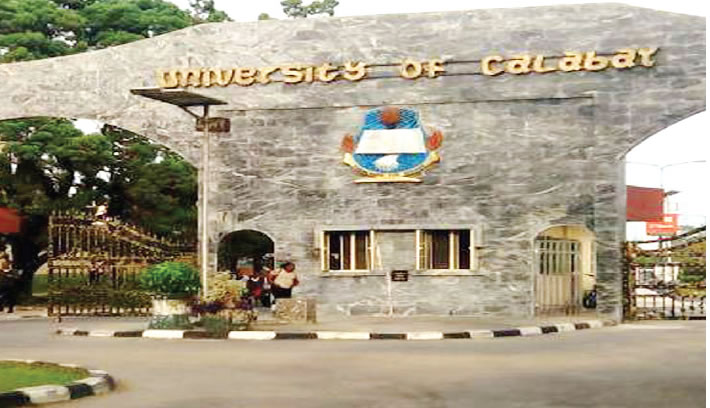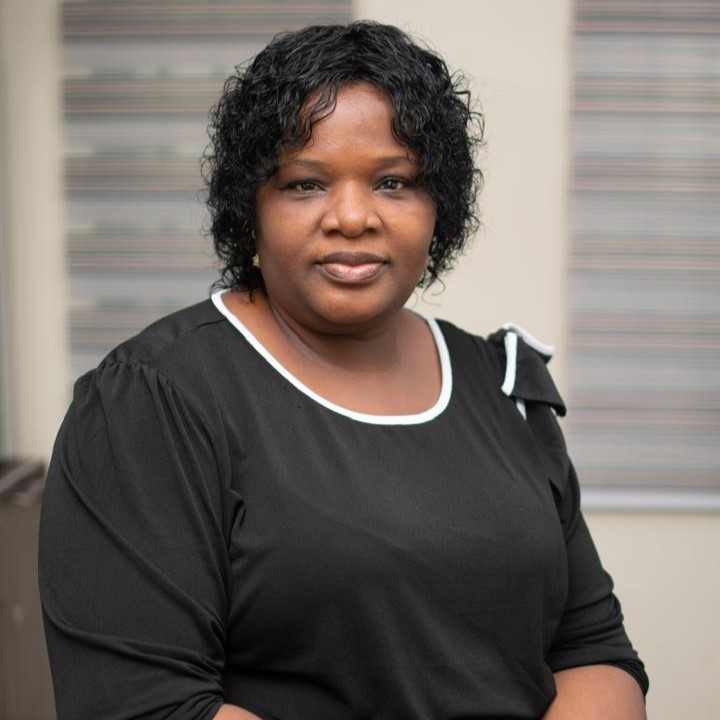Due to the institution’s continued disregard for admission quota, the fate of about 300 dental students of the University of Calabar (UNICAL), Cross River State, is currently hanging in the balance as the institution’s authorities have reportedly asked the hapless students to “go and learn a trade”. DevReporting shares the pathetic details in this report.
When the Provost of the College of Medical Sciences at the University of Calabar (UNICAL), Cross River State, South-South Nigeria, Ngim Ngim, a professor, allegedly told the institution’s dental students to “go and learn a trade,” his words were said to have cut deeper than any surgical knife they had been trained to wield.
For over 300 students at the university’s faculty of dentistry, what began as a path towards a prestigious profession has turned into a devastating lesson on institutional failure.
According to the students, many of whom have already spent more than five years in the faculty due to strikes and delays, those words sounded heartbreaking and disrespectful of their years of academic struggle and financial investment.
But the university’s Vice-Chancellor, Florence Obi, a professor, has denied that anyone told the students to “go and learn trade,” requesting the students to name whoever said so at any time.
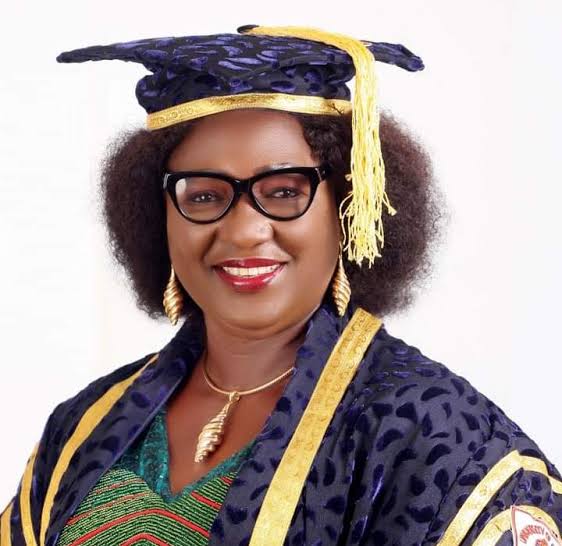
Ms Obi said though the problem predated her tenure, and that MDCN had been aware of the issue since 2013/2014 when it started, she was confident that the matter would be resolved soon.
What transpired?
The crisis began after 60 final-year dental students sat their professional examinations, but only 32 passed and were presented to the Medical and Dental Council of Nigeria (MDCN) for verification.
The MDCN, the regulatory body responsible for medical and dental practice in the country, however, failed to process the list after discovering that UNICAL’s approved graduation quota for Dentistry was only 10 students per year under its provisional accreditation.
READ ALSO: FULL TEXT: Dapo Olorunyomi’s lecture at Ajayi Crowther University on Nigerian journalism
Alarmed by the university’s continued reckless practice of admitting up to 90 students annually, far exceeding its authorised capacity, the council summoned the vice-chancellor, Mr Ngim, among other officials, to explain the irregularities.
Subsequently, on Tuesday, 8 July, the council gave its verdict that the university must comply with the accreditation directive. In response, the university offered affected students options of seeking transfers to other institutions or other programmes. Students were told to go home until further notice, while others said they were told to sit another Unified Tertiary Matriculation Examination (UTME).
The Chairman of MDCN, Afolabi Lesi, a professor at the College of Medicine of the University of Lagos (CMUL), Idi-Araba, expressed strong disapproval of the university’s actions, confirming that the council was aware of the situation.
Mr Lesi said UNICAL was “in serious breach of its approved quota,” describing the disregard for regulatory guidelines as unacceptable.
Charlotte, a 500-level dental student, told lightraymedia that the problem began when the faculty started ignoring this quota. “They obeyed the directive to stop admitting for only two years, then resumed. That’s why there’s a year one class now,” she explained.
She explained that dentistry is meant to last six years plus a year each for internship and NYSC, but noted that many students have spent eight to nine years due to strike actions.
Ms Charlotte, therefore, appealed to UNICAL to absorb the affected students into the Department of Medicine and Surgery since both faculties study the same courses up until year five. According to her, transferring to another school comes with a lot of psychological and financial stress.
Financial toll beyond tuition
The financial implications are staggering. DevReporting gathered that 100-level students paid over N235,080 each in fees and levies, 400-level students paid about N158,320 per session, while 500-level students paid N145,320 each, excluding personal costs such as essential dental tools worth an additional N150,000.
For many families, these payments represent life savings. It was gathered that one mother cried during a meeting with the university, pleading for her daughter to be absorbed into Medicine. The response of the provost shocked the hall.
He said: “We admitted more than our quota, hoping some would fail and it would balance out,” claiming it was a ‘normal practice’ across universities.
Vice-chancellor speaks
The university’s vice-chancellor, while reacting to the development in an exclusive interview with DevReporting, clarified that the university has not lost its accreditation.
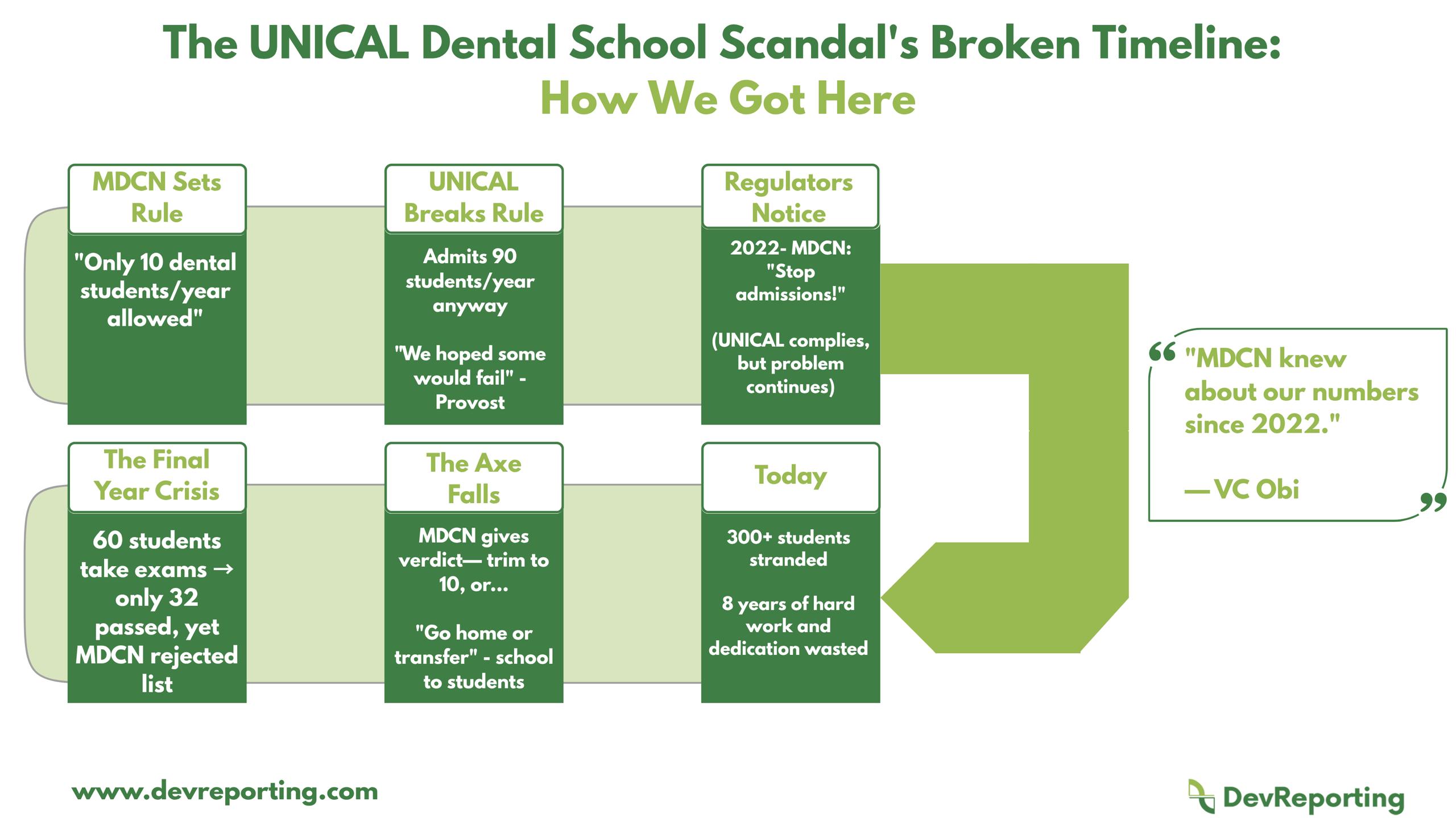
She said: “Nobody has withdrawn the accreditation of UNICAL. We have full accreditation from the Medical and Dental Council of Nigeria (MDCN), which will remain so till 2027. We also have full accreditation from the National Universities Commission (NUC), which will remain so till 2029. So, the claim that they have withdrawn our accreditation is false; it’s wrong information in the first instance.”
Ms Obi said the problem with the university’s dentistry students has to do with admission of students beyond the allotted quota, “and that is why MDCN said the excess students should be transferred to other schools, or other classes, or other programmes.”
“And we are still working around that instruction,” the vice-chancellor said.
She also denied the allegation that the situation had persisted over the years, saying such a claim is not correct “because in the past three years, I have not admitted Dentistry students.”
“This is a problem that I inherited. It started around 2013/2014, and the Dentistry students that I have now are in 400, 500, and 600 levels. We do not have for 100, 200, and 300 levels. So, it’s not something that happened in the last three or four years,” she said.
“MDCN was aware before now”
The vice-chancellor also hinted at the MDCN changing the rule in the middle of the game, saying the regulatory body was aware of the situation and that since the university was instructed to stop admitting fresh students since 2022, it had stopped.
Ms Obi said: “Even MDCN also knew that we had that number of students before they gave us accreditation, and they told us, ‘Don’t admit again,’ and that they would look into how to resolve the issue. Since they told us in 2022 not to admit again, we have not admitted. They are also working with us to resolve the issue.”
New Sheriff in town
Asked the reason for the new directive by the MDCN if it was aware that the university was in the habit of admitting beyond its quota, the vice-chancellor said, “There is a new sheriff in town.”
The vice-chancellor may be referring to the new Minister of Education, Tunji Alausa, a medical doctor, who, this newspaper understands, has been very concerned about non-adherence to extant rules and guidelines by Nigeria’s academic institutions.
She, however, reiterated the point that the matter was still being resolved by both the university and the regulatory body.
“Though the issue predated my assumption of office but we would resolve it because administration is a continuum,” Ms Obi said.
Protests amid unclear future
Devastated by the situation, students staged a protest on Monday in front of the vice chancellor’s office, demanding answers about the fate of over 300 dental students whose admission status is now threatened.
Ms Obi, while addressing the students in a meeting, explained that it is normal practice across universities to admit more students than the quota to account for expected reductions over time, a phenomenon she described as “attrition.”
She, however, expressed that the current batch of dentistry students performed exceptionally well, contrary to expectations of high attrition, and commended their brilliance.
While the affected students proposed solutions, including merging them with their Medicine and Surgery counterparts, and providing funds to meet the requirements set by the MDCN to increase the quota, neither the vice chancellor nor the provost gave a concrete response or assurance.
NADS condemns UNICAL’s action
Reacting, the Nigerian Association of Dental Students (NADS) has condemned what it described as “an appalling and inhumane response” to the crisis.
The association, in a statement signed by its President, Victory Omuera, expressed grave concern over the fate of over 300 dental students now facing an uncertain future due to the university’s gross over-admission practices.
“Most alarming is the report that some final-year students, after spending over seven to eight years in training, were bluntly told by a university official to go and learn a trade. This is an appalling and inhumane response to a situation caused solely by administrative actions,” the association stated.
The student body demanded an immediate suspension of any directive asking students to transfer or abandon their studies. It also called for a clear roadmap to resolve the accreditation crisis, as well as urgent engagement with the MDCN to protect the academic standing of all affected students, particularly those on the brink of graduation.
“You are not alone. We recognise your pain, your frustration, and your sacrifices. We will continue to advocate for you and push for a resolution that honours your commitment and restores your academic path,” the statement reads.
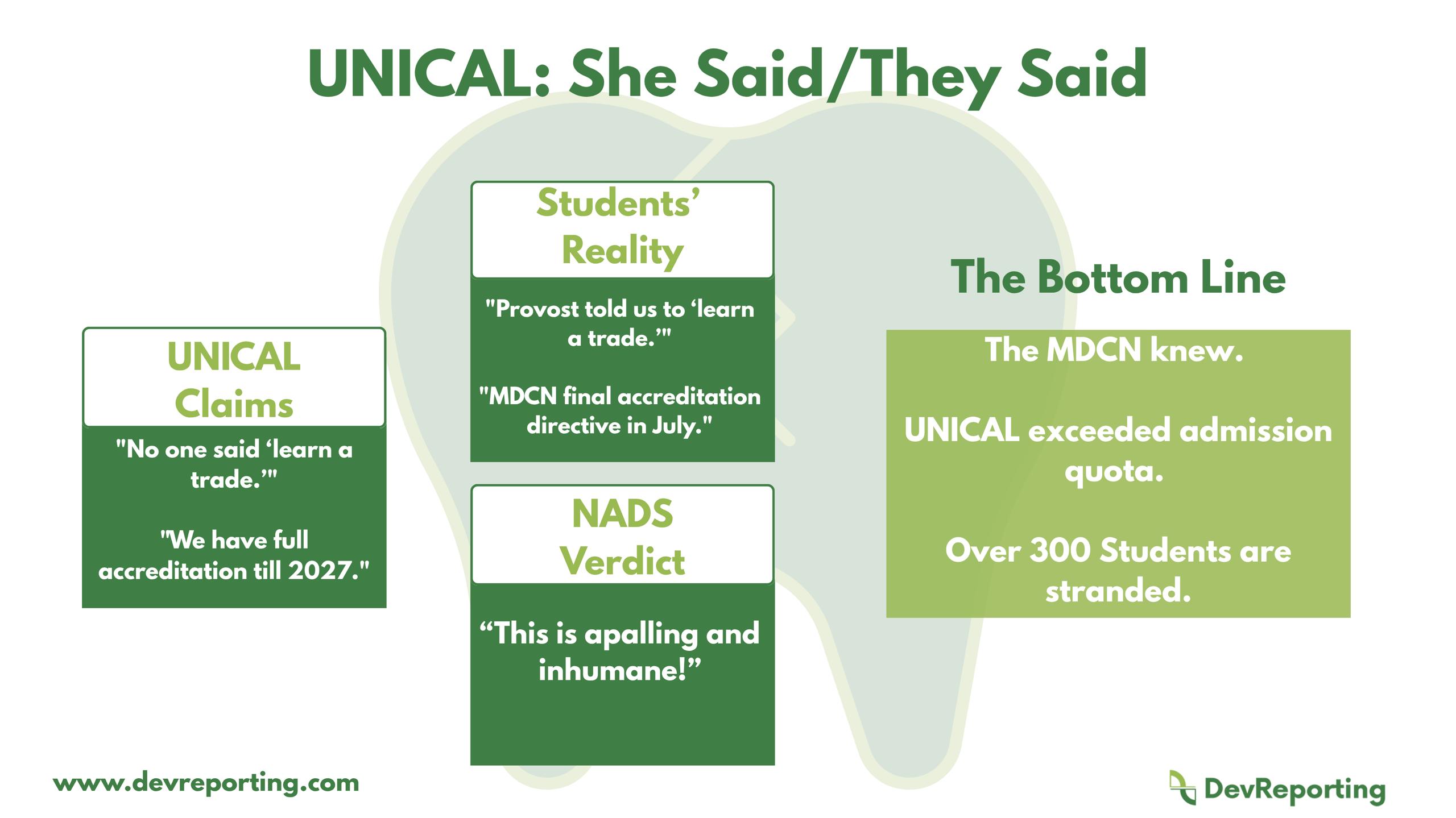
The association urged the MDCN, the Nigerian Dental Association (NDA), and the Federal Ministries of Health and Education to intervene swiftly and ensure that justice and compassion guide the way forward.
MDCN Registrar, NUC keep mum
Meanwhile, spirited efforts to get the reactions of the MDCN Registrar, Fatimah Kyari, failed. She did not pick many calls to her telephone line. She also failed to respond to inquiries shared with her as short messages and on her known WhatsApp line.
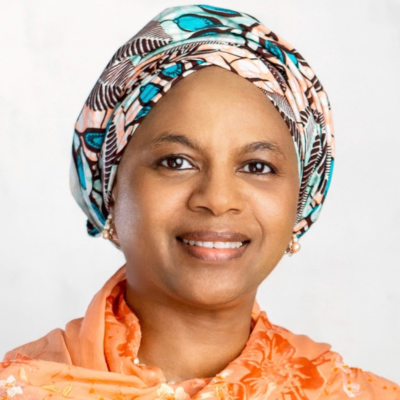
Earlier, when contacted, the Head of the Corporate Affairs department at the MDCN, Zubaidat Abdulsalaam, said she could not speak on the development. She said only the registrar could comment on the matter.
Similarly, the Acting Director of Public Affairs at the National Universities Commission, Franca Chukwuonwo, advised this newspaper to send a message when she picked a call to her telephone line. However, hours after the questions were delivered to her phone through her WhatsApp number, she had yet to respond as of the time of filing this report.
Students left in limbo. What next?
Many students had since remained on campus, unwilling to accept a future of wasted years and dashed dreams.
For now, their fate hangs in the balance. As stakeholders debate solutions, the students’ demands remain simple: “Absorb us into another department. Protect our years of sacrifice. Give us a chance to finish what we started.”

